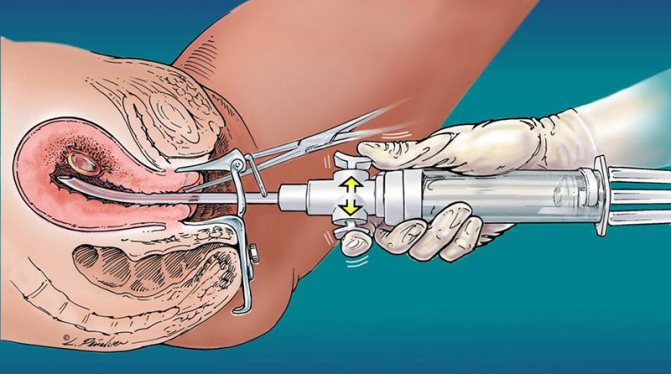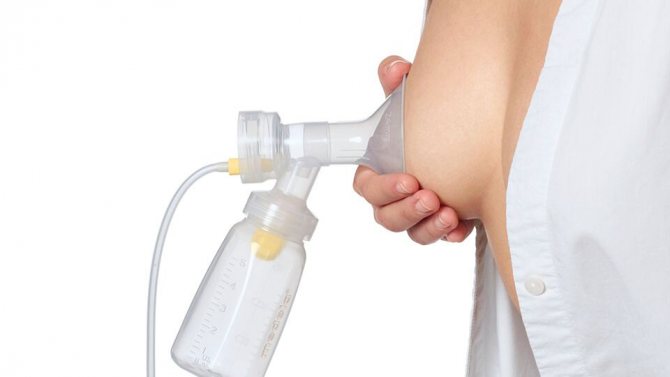The first six months after the birth of a child, a woman’s body goes through a difficult stage of recovery after the enormous stress during pregnancy and childbirth. At the same time, there is a myth among women that during breastfeeding a young mother cannot become pregnant. In fact, the lactation method of contraception cannot be called reliable, since in some women the first ovulation occurs as early as 6 weeks after birth.
Against the background of hormonal changes, the menstrual cycle may not be restored for a long time, which also does not allow a woman to fully control the likelihood of conception. As a result, unwanted pregnancy during breastfeeding is not uncommon.
Making a decision to continue pregnancy immediately after childbirth is not easy. In some cases, a woman is not yet ready for the birth of a second baby, and in others, repeated births during this period are contraindicated for health reasons (for example, after a cesarean section). This raises the question of having an abortion during breastfeeding. Medical abortion is considered the safest and least traumatic method of abortion in modern gynecology, but can it be performed during breastfeeding? Let's figure it out together with the experienced specialists of the Diana Medical Center.
Types of abortions
There is a wide range of procedures for terminating pregnancy.
The most popular abortions are:
- Medication. Mifepristone-based drugs are used for a period not exceeding 6 weeks.
- Surgical. It is considered a dangerous method and is only used up to 14 weeks of pregnancy.
- Vacuum aspiration. Indicated for up to 7 weeks. With a shorter period of time, the procedure is easier to tolerate. It is performed under local or general anesthesia.
Before carrying out the procedure for removing the fertilized egg, the doctor prescribes tests. Specific studies are shown for each species.
Only a gynecologist can determine the best type of abortion; the woman’s wishes are not taken into account. The patient’s health status and possible consequences are taken into account.
Which method of abortion should I choose while breastfeeding?
Many women categorically refuse medical abortion during breastfeeding, due to the risk of pharmacological drugs passing into breast milk. In this case, the young mother chooses a surgical curettage technique that is more traumatic and dangerous to her health in order to continue lactation. However, is such a risk justified? Gynecologists assure that this is not always the case.
The first thing that is important to understand is that medical abortion can be performed during breastfeeding, provided that the child’s feeding pattern is changed. Depending on the drug chosen for pharmacological abortion, the woman will have to stop breastfeeding for a period of 3 days to two weeks. During this time, breast milk should be expressed regularly and the baby should be fed formula. At the same time, of course, there is a risk of the baby further refusing to breastfeed, which is undesirable, because no formula can replace a baby’s mother’s milk.
However, this is not at all a reason to choose a surgical method of termination of pregnancy, since, contrary to the misconception of many women, in this case you will also have to stop feeding for several days. This is due to the use of anesthetic drugs for surgical abortion. As a result, both methods will require the woman to temporarily interrupt breastfeeding, but medical abortion is accompanied by significantly lower risks for the woman’s body.
Probability of pregnancy during breastfeeding
Many women are confident that during lactation they are reliably protected from unwanted pregnancy; there is no need to use additional contraceptives. But this is a mistaken opinion.
The method of natural contraception (lactational amenorrhea) is that feeding the baby with breast milk is an obstacle to the next pregnancy. If certain conditions are met, the reliability of this method is 98%.
Required:
- A child up to six months should be fed not at a set time, but at his request, including at night. There should be 10 short feedings or 6 long ones, the intervals between them cannot be more than 6 hours. You cannot supplement your baby with formula or give him a pacifier.
- After 6 months, complementary feeding begins, and less human milk is required. During this period, you need to start using contraceptives.
In some young mothers, the menstrual cycle may resume already during the lactation period, which will create the preconditions for an unwanted pregnancy.
To avoid getting pregnant after childbirth, you must strictly follow the rules of natural feeding of a newborn.
Consequences
The most negative consequences of medical abortion are not on the baby, but on the female body. The main problem is that the woman has not yet fully strengthened and recovered from childbirth. And any invasion in any case will have consequences, at least moral ones. It is extremely important to keep them to a minimum:
- If you need to terminate your pregnancy, do not allow yourself doubts or regrets. Of course, this is a severe injury, but you have to think about the baby in your arms. Your depressive state will certainly affect your child’s emotional state. The nursing female body transmits all the information to the baby.
- Depending on the individual, digestive system disorders (vomiting, nausea, diarrhea, stomach cramps and colic), as well as headaches, may occur.
- Often, abortion is accompanied by strong contractions of the uterus, which are quite painful. Contractions may continue for some time after the procedure. In some cases, bleeding is observed. It should be noted that isolated cases of uterine rupture have been recorded.
Doctor about the consequences and contraindications of abortion: video
Use for hepatitis B
Before the intervention, a comprehensive examination of the patient is carried out.
These include:
- blood test for pregnancy, determination of Rh factor and group;
- detailed coagulogram (determines blood clotting);
- smear to examine the microflora of vaginal discharge;
- biochemical blood test with study of the amount of glucose and liver tests;
- analysis for syphilis and other STDs (sexually transmitted diseases), HIV, hepatitis;
- OAM (general urinalysis);
- ultrasound examination (ultrasound);
- fluorography.
If a woman is specially registered with pathologies of the heart, kidneys or other diseases, then an additional diagnostic test will be carried out, which the doctor must prescribe individually.
Medication method
During a medical abortion, a drug is used that provokes detachment of the fertilized egg and its release. These can be tablets, injections or suppositories. Therapy is carried out in 2 stages, the break is 3 days. An ultrasound (ultrasound) is performed to confirm the success of the procedure.
The procedure does not require the patient to stay in a hospital for a long time. The onset of bleeding is usually expected at home. But taking medications on your own is impossible. You can start breastfeeding your baby only after 3-5 days.

Vacuum abortion
Vacuum aspiration takes no more than 6-10 minutes. If the pregnancy is short, local anesthesia is indicated. With general anesthesia, the yield is the same as with surgical curettage. After 3-6 hours, you will be allowed to feed the baby.

Operations
The surgical intervention is performed in a hospital; an anesthesiologist is also present during the procedure, who monitors the condition of the woman under anesthesia. The procedure takes 15-20 minutes. The time to recover from anesthesia depends on the condition of the woman’s body. It can last from one to three hours. The baby is allowed to be put to the breast after 4-5 hours.

New research into the impact of medical abortion on breast milk quality
In any case, a medical abortion is permissible only under the supervision of a specialist who will first carry out the entire range of necessary diagnostic measures. Moreover, if the patient is breastfeeding at the time of termination of pregnancy, the doctor will recommend a plan for temporarily stopping breastfeeding. It is important to understand that such a measure is only insurance against possible risks, since research into the effect of drugs for medical abortion on the quality of breast milk is still ongoing.
So, quite recently, regular research was carried out by famous world scientists on this topic. The experiment proved that only minimal doses of the drug used for pharmacological termination of pregnancy are able to pass into breast milk. The maximum concentration of the chemical in a woman’s milk was 1.5%, which is considered a negligible dose that cannot harm the baby.
Doctors conducting this study concluded that it is enough to stop breastfeeding for a period of 4 to 10 hours to completely eliminate the possibility of harmful effects of chemicals used for medical abortion on the baby’s body. However, until all stages of clinical evaluation have been completed, these results cannot be considered reliable and final, and therefore you should listen to the feeding cessation plan that the doctor selects.
When contacting a doctor to terminate a pregnancy during breastfeeding, it is very important to inform the specialist about the fact of lactation and recent childbirth. Having knowledge and experience in this field, the doctor will choose the optimal drug and dosage in order to ensure guaranteed safety of the baby and increase the likelihood of continued breastfeeding.
If you find an error, please select a piece of text and press Ctrl+Enter
According to the instructions for the drugs, it is recommended to stop breastfeeding for 14 days (for mifepristone) and for 7 days (for misoprostol). Thus, the total period of abstinence from breastfeeding will be 14 days, which may lead to the cessation of subsequent lactation and the transfer of the child to artificial feeding.
However, recent studies have shown the safety of breastfeeding by a mother taking mifopristone and misoprostol, and therefore more optimal tactics are recommended during medical abortion or induction of labor with these drugs. Below are scientific research data and recommendations from the most authoritative sources - the World Health Organization, the American Federation for the Supervision of Drugs and Dietary Supplements and Pharmacovigilance of Russia.
In Sweden, levels of mifepristone in breast milk obtained from women undergoing medical abortion were studied. Milk samples were collected during the first 7 days after administration of either 200 mg or 600 mg mifepristone. It was found that the concentration of the active substance in breast milk is very low (from Reply
The selection of a method for terminating an unwanted pregnancy directly depends on the following factors: Duration of pregnancy; The desire of the young mother to continue natural feeding; Methods of delivery (natural birth or cesarean section).
This type of abortion involves the use of a special group of drugs that promote the rejection of the fertilized egg from the uterine cavity. In most cases, medications containing Mifepristone are used. During clinical studies, no information was obtained regarding the effect of this group of drugs on lactation and the body of a newborn baby through breast milk.
Official sources indicate that when using the drug with Mifepristone, the active substance enters the bloodstream of the young mother in a minimal amount, which allows breastfeeding to be continued. Another common drug for tablet abortion is Misoprostol. This chemical compound passes into breast milk in small portions, which are quickly eliminated from it.
If a woman used this drug to terminate a pregnancy, then she should refrain from putting the baby to the breast for 5-6 hours. If Gimeprost is the drug for medical abortion, then when using it, the period of abstinence from breastfeeding is at least 24 hours. This period is enough for the active substance of the drug to completely drain from the woman’s body.
The duration of a medical abortion cycle is from 1.5 to 3 days. In order to protect your child from the entry of potent chemical compounds into his body, it is important for a young mother to refrain from breastfeeding for 3 days.
You can google and find information on the Internet. Be sure to talk to your gynecologist about the possibility of preserving breastfeeding during MA.
A woman who is breastfeeding cannot be completely protected from unwanted pregnancy. When making a decision to terminate, it is important to know whether abortion is possible with gw.
For an infant, the quality of mother's milk is of great importance. But it is influenced by many factors, including medications and surgical interventions. This is why it is so important to understand whether breastfeeding and abortion are compatible.
The female body recovers differently after childbirth. It may take several weeks to several months to resume normal sex life. Doctors usually recommend starting sexual activity 4-6 weeks after the baby is born.

Many women believe that breastfeeding itself protects against unwanted pregnancy. Therefore, when having intimacy with your partner, they do not think about additional methods of contraception. This often leads to fertilization.
Can lactation be a reliable method of contraception? Indeed, there is a so-called lactational amenorrhea method. It lies in the fact that a woman’s hormonal background does not allow her body to become pregnant. However, it works under certain conditions, which not all women take into account:
- The method works for the first 6 months after birth;
- the child should take only breast milk, without supplementary feeding or formula feeding;
- if you don’t have your period yet;
- feeding during the day should be at least 10 times;
- The break between feedings should not exceed 3 hours, including at night.
If at least one of the points is violated, the effectiveness of the lactation method is sharply reduced. This leads to unwanted pregnancy. Then the question arises, is it possible to have an abortion if you are breastfeeding?
Mother's preparation
Any abortion is a serious trauma, not only physical, but also psychological. Therefore, you need to understand that preparation is required for the health of not only your own, but also the already born child.
When preparing a mother for an abortion during breastfeeding, the following is required:
- stop taking anti-inflammatory medications;
- exclude alcoholic drinks 2-3 days before the procedure;
- You need to stop smoking 24 hours before surgery;
- during a surgical abortion, avoid eating on the day of the procedure;
- warn the doctor about taking aspirin, because it makes the blood thinner and it will be difficult to stop possible bleeding;
- take a compulsory medical insurance policy (compulsory health insurance), test results, hygiene supplies, and a change of underwear.
Since the woman will feel unwell and also experience stress, she should decide in advance which of her loved ones will help her get home.
You should discuss with your doctor the issue of continuing to breastfeed your baby. He will select the appropriate method and give recommendations for maintaining lactation.

How to terminate a pregnancy
If a woman decides to terminate her pregnancy, it is important not to blame herself. Depression has never helped anyone cope with the problem. The quantity and quality of breastfeeding milk is affected not only by medical manipulations, but also by the psycho-emotional state of the nursing mother.
Termination of pregnancy is carried out in two main ways:
- medical abortion is a non-contact method that is based on the effects of chemicals;
- instrumental abortion - can be performed by curettage or using the vacuum method.
The choice of method depends on the specific case. All details must be discussed with your doctor. The specialist will recommend a regimen in which you can perform a medical abortion and maintain lactation.
If a woman intends to continue breastfeeding, abortion cannot prevent this. The main thing is to be determined to maintain lactation after an abortion.
Feeding scheme
When using medications, you should avoid breastfeeding for a period of 5 to 12 days. After a break of 2 weeks, in most cases, cessation of lactation is observed. In this case, the child is transferred to artificial feeding.
When using the drug Gemeprost, the active substance of the drug is eliminated from the body within 24 hours. Thus, you can resume feeding after the procedure within 24 hours.
With the instrumental method of abortion, lactation is restored after the anesthesia wears off. In rare cases, you still need to take a short break. This is due to the type of anesthesia. It is advisable to put the baby to the breast after 5-6 hours.

Scientific research
An interesting fact is that the results of experiments conducted by world experts showed a very low concentration of active substances in human milk during medical abortion. The maximum content at the highest concentration is 1.5%.
The authors of the study concluded that the drug has a negligible concentration in human milk and, therefore, does not harm the baby during feeding. Therefore there is no need to interrupt feeding.
A number of other European medical figures, after conducting large-scale research, came to a similar conclusion. They recommend interrupting feeding for 4 hours immediately after using the drug. Thus, drug research is not yet completed. And you should follow the recommendations of pharmaceutical manufacturers.
Condition after abortion
Most often, young mothers report pain and heavy bleeding. This is caused by the action of drugs and manipulations performed and is considered a natural reaction. You can relieve pain with the help of antispasmodics, which will be selected by your doctor.
Bleeding is not dangerous if it does not become excessively profuse. The permissible volume is 1-2 pads, filled in 50-60 minutes. Within 3-4 days the bleeding will stop, giving way to mild spotting. In this form it can last from 1 to 4 weeks.
It is recommended to visit the clinic 3 days after the abortion to have another ultrasound. In 1-2% of abortions, the fertilized egg does not leave the uterus and must be removed using vacuum aspiration.
The day the bleeding begins should be considered the first day of the cycle, and menstruation should appear after the usual period of time.
Headache, allergy to the drug, dyspeptic symptoms - these consequences are recorded in a small number of women.

Doctors' answers

Despite the fact that the annotation states to stop breastfeeding for 3 days, according to the international drug compatibility guide, this drug carries a moderate risk, i.e., it is moderately compatible. It is used for a short period of time, and its binding ability to plasma proteins is high, which explains the clinically insignificant excretion into breast milk (penetration into milk). According to foreign experts, as well as the results of their research, they can conclude that the active ingredient miropristone (mifepristone) reaches very low concentrations in mothers’ breast milk, and this drug will not harm lactation and your grown baby. Considering your baby's age, when attachments become less frequent, the risk is minimized. This way, you don't have to stop breastfeeding at all. If you are still afraid, then follow the instructions, it says to postpone breastfeeding for 3 days.
- 2017-02-01 08:01:03
Hello, I took the medicine Mifepristone and can feed my baby
We need to know your opinion. Leave a review about our service

Despite the popular belief that it is impossible to get pregnant while breastfeeding, quite often this is not the case. And then the mother is faced with the question: to give birth to another baby or to terminate the pregnancy. There are often many factors that make the first option simply not possible. And no matter how sad it is, you have to have an abortion during breastfeeding.
Recovery period
After termination of pregnancy, doctors should give the woman recommendations for restoring her health, which should reduce the likelihood of developing serious complications.
The main ones:
- in the first three weeks you cannot visit swimming pools, baths, solariums;
- you need to devote more time to rest, temporarily stop playing sports and physical labor;
- Sexual relations should be postponed until the end of menstruation;
- carefully monitor the health, nature and duration of vaginal discharge: if it becomes abundant, an unpleasant odor appears, then you should immediately visit a gynecologist;
- It is necessary to eat only healthy foods and choose multivitamin complexes.

Surgical abortion and breastfeeding
Instrumental termination of pregnancy also affects the ability to maintain breastfeeding. We are talking about the use of anesthesia. The specialist can choose the anesthesia that is most suitable for the patient.

In the early stages of pregnancy, the vacuum method, which is often called a mini-abortion, has proven itself well. Obstetricians and gynecologists tend to perform the vacuum procedure. Such an abortion has fewer negative consequences and in most cases does not require cessation of lactation.
It is performed under local anesthesia. Most likely, the procedure will require interruption of breastfeeding for only a few hours. For example, Lidocaine and Propofol pass into milk, but in minimal quantities. After them, it is better to pause breastfeeding for several hours and during this time express a couple of times.
Be sure to ask your doctor what kind of anesthesia was used and whether it is allowed for breastfeeding!
When can breastfeeding be resumed after surgery and general anesthesia? It all depends on what kind of anesthesia was used. Nitrous oxide and other inhalational anesthetics are safe for your baby. But, for example, Fentanyl is harmful during breastfeeding; it penetrates into milk and is excreted for several days.
Possible complications
Complications that may appear after artificial termination of pregnancy while breastfeeding can be early and late. The former develop at the time of the manipulation, the latter - after a few hours or days.
The most common complications:
- bleeding;
- remnants of the fertilized egg in the uterus;
- injury to the cervix when exposed to instruments for dilatation;
- damage to the uterine wall.
Allergic reactions, intolerance to anesthesia or other medications may occur.
Late complications develop over a fairly long period. Sometimes they appear months or even years later.
Late consequences:
- inflammation of the genital organs;
- disruption of the menstrual cycle;
- infertility;
- adhesions in the uterus;
- mastopathy;
- lack of patency of the fallopian tubes;
- pathological course of subsequent gestation;
- complicated course of menopause;
- formation of scar tissue in the cervix;
- mental disorders.
Abortion of any kind sometimes provokes the appearance of malignant tumors of the uterus, ovaries and breasts.

Be responsible!
Breastfeeding is an extremely important period for the baby's health. A woman must strictly monitor her diet. Any medications can have dire consequences. Therefore, in the case of a medical abortion, it is impossible to do without the strict presence of a medical specialist.
- First, the doctor must find out whether this method of terminating a pregnancy during breastfeeding is suitable for your body.
- Secondly, it is in the presence of a doctor that the active medication is used. And, naturally, minimal consequences can only occur if the rules of the recovery period are observed.

Whatever method of termination of pregnancy you choose, remember the need to prepare for a break from breastfeeding. So, before going for an instrumental abortion, express a sufficient amount of milk, which will feed the baby during your absence. When undergoing a medical abortion, consult with your doctor about which medications will be used to terminate the abortion, and after what time you can resume breastfeeding without endangering the baby’s health.
When to stop lactation
In rare cases, stopping breastfeeding is required. This may be caused by maternal illness or medication. Medicines are eliminated from the body over time. During this period, it is important to take care of the child’s balanced diet.
A woman should express milk by hand or using electric breast pumps. This will relieve discomfort in the chest area. The volume of expressed milk should be small so as not to stimulate lactation.
When stopping breastfeeding, some women, especially those susceptible to depression, may need support from relatives or psychological help.
With a vacuum abortion (mini-abortion), you can continue to breastfeed your baby without negative consequences.
Abrupt withdrawal from breastfeeding should be avoided. You should wean your baby little by little so that he refuses milk on his own.

Actions to maintain lactation
When planning an abortion with the help of medications, a nursing mother should think in advance about the strategy for weaning the child from the breast and choose a way to maintain lactation:
- children over 3 months old can be gradually accustomed to a full night's sleep without feedings (first, skipping 1 feeding, then switching to 8 hours of sleep without feedings);
- it is advisable to prepare and freeze milk before taking mifeprestone; in this case, the amount of milk and the duration of preparation depend on the period for which weaning is planned;
- if the break is more than a day, you need to maintain lactation by expressing milk.
The decision to stop or maintain lactation during the period of termination of an unplanned pregnancy is made by a woman independently. Your doctor's recommendations will help you get more information and decide on breastfeeding during a medical abortion.
Competent, experienced and responsible specialists from our medical center provide individual consultations and detailed recommendations regarding the period of medical abortion and the first two weeks after it.
Prices:
| Code | Name of service | Prices |
| 1 | Initial appointment | 1200 |
| 2 | Repeated appointment | 900 |
| 3 | Pelvic ultrasound | 1400 |
| 4 | Second trimester ultrasound | 1900 |
| 5 | Ultrasound of the third trimester | 2400 |
| 6 | Doppler 2-3 trimester | 1200 |
| 7 | Colposcopy | 1500 |
Reviews
We have two children, the youngest daughter is 7 months old. I got pregnant again. I consulted a doctor about terminating an unwanted pregnancy. I took tests. There were no deviations from the norm. Injections were prescribed. After the abortion, I felt fine, but occasionally experienced dizziness and mild pain in the lower abdomen. Heat treatments and aspirin were prohibited so as not to cause bleeding. Everything worked out fine.
Emma, 30 years old, Norilsk
I had a medical abortion for up to 6 weeks in a private clinic. Everything went well, there was no heavy bleeding or severe pain. I felt a little nauseous and felt weak. It was very difficult mentally, I felt constantly depressed. I advise everyone to take careful precautions.
Evgenia, 27 years old, Belgorod
An ultrasound showed a short period of time – 5 weeks. I took 3 tablets, felt weak, and later began to feel sick. After the next dose of the medicine, blood clots began to come out within 3-4 hours. I really wanted to lie down. This state lasted 12 days. I recommend vacuum aspiration to everyone, I have done it before, rather than a medical abortion. But it is best, of course, to carefully protect yourself.
Valentina, 34 years old, Malaya Vishera
Pros and cons of pharmabort
Termination of pregnancy at any stage does not leave its mark on the female body, however, if we compare pharmabortion with other types of removal of the fertilized egg from the uterine cavity, we can highlight a number of pros and cons of the procedure.
The advantages of medical abortion are:
- Minimal risk of complications such as bleeding and damage to the uterine mucosa;
- Does not develop;
- Possibility of implementation for nulliparous women and young mothers after cesarean section;
- Psychological aspect - pharmaabortion is perceived more easily by patients;
- Outpatient mode - a few hours after taking the first dose of tablets, the patient can go home, whereas after surgical removal of the embryo from the uterus, the woman needs to stay in the hospital for several days.
Disadvantages of medical abortion:
- Incomplete removal of membranes - occurs when the dose of the drug is incorrectly calculated or abortive pills are used during pregnancy over 4-5 weeks;
- Continuation of pregnancy - occurs extremely rarely, only in 2% of cases;
- Individual intolerance to the drug - nausea, vomiting, disruption of the cardiovascular system;
- Hormonal imbalance in the body.
Pain after medical abortion
After abortion with the help of pills, the body needs time for the reproductive system and endocrine glands to restore their function. After taking pills with an abortifacient effect, the patient may experience pain in various locations:
- Pain in the lower abdomen
is caused by contraction of the uterus and expulsion of the fertilized egg and membranes from the body. If abdominal pain is accompanied by an increase in body temperature and discharge of pus from the vagina, you should immediately seek help; - Pain in the mammary glands
- during pregnancy, a woman’s mammary glands become highly sensitive, increase in size, become hard and hurt. After taking abortion pills, reverse changes and restructuring occur in the body, so chest pain will persist for some time. As a rule, with the onset of menstruation, all unpleasant phenomena disappear; - Pain in the ovaries
- abortion pills cause serious hormonal changes in the body and the organs of the reproductive system, in particular the ovaries, are the first to respond to changes. Pain in the ovarian area after taking abortion pills is caused by an increase in their size and increased inhibition of the production of the pregnancy hormone.
Painkillers and No-Spa during and after medical abortion
Abdominal pain after taking abortifacient pills resembles pain during menstruation. It is highly undesirable to take No-shpa or other drugs with antispasmodic and analgesic effects to reduce pain. Although these pills relieve spasms, they also negatively affect the contractility of the uterus, and this can lead to incomplete removal of the membranes from the body. You can reduce pain in the lower abdomen after a medical abortion by lying on your stomach. In this position, the clots leave the uterus faster and more efficiently, which in itself reduces pain. If the pain is excessively strong and the woman cannot tolerate it, you should consult a gynecologist for advice; perhaps the dose of the medicine was incorrect.
Is it possible to get pregnant after a pharmacological abortion?
Pharmacological abortion creates a situation in the body similar to a spontaneous miscarriage. Over the next 28-35 days, the body recovers and menstruation begins. If a woman has sex during this period and does not use contraception, then a new pregnancy is highly likely. In order not to risk your health and not be faced with a difficult choice again, you should carefully protect yourself in the next 3-6 months after a medical abortion.
Is it possible to drink alcohol after pharmaabortion?
After taking abortifacient pills, a woman should not drink alcohol, as alcohol can negatively affect the pharmacological effect of the drug. Combining Mifepristone tablets with alcohol is fraught with incomplete abortion and the development of inflammatory processes in the uterus.
Sex after pharmacological abortion
After taking abortifacient pills, a woman, as after any other type of termination of pregnancy, should abstain from intimate relationships for the first 14 days. Once the discharge stops and the doctor confirms that there are no particles of membranes left in the uterus, the couple can resume sexual relations, but contraception should be used to avoid another unplanned pregnancy.
Breastfeeding after pharmacological abortion
If a woman is forced to undergo a pharmacological abortion during lactation, then after taking abortion pills the child cannot continue to breastfeed. The active ingredients of the pills can pass through breast milk into the child’s body, and since studies on the safety of the drug for children have not been conducted, medical termination of pregnancy and continued feeding of the child incompatible.
Despite the fact that most medical experts indicate the impossibility of re-conception during lactation, the number of cases of pregnancy during breastfeeding continues to rise steadily.
If a young mother does not plan to have a child at this stage of her life, then the question arises about the possibility of a mechanical or medical abortion. The method of surgical and tablet abortion has a number of characteristic features that must be taken into account before using one of the methods.











